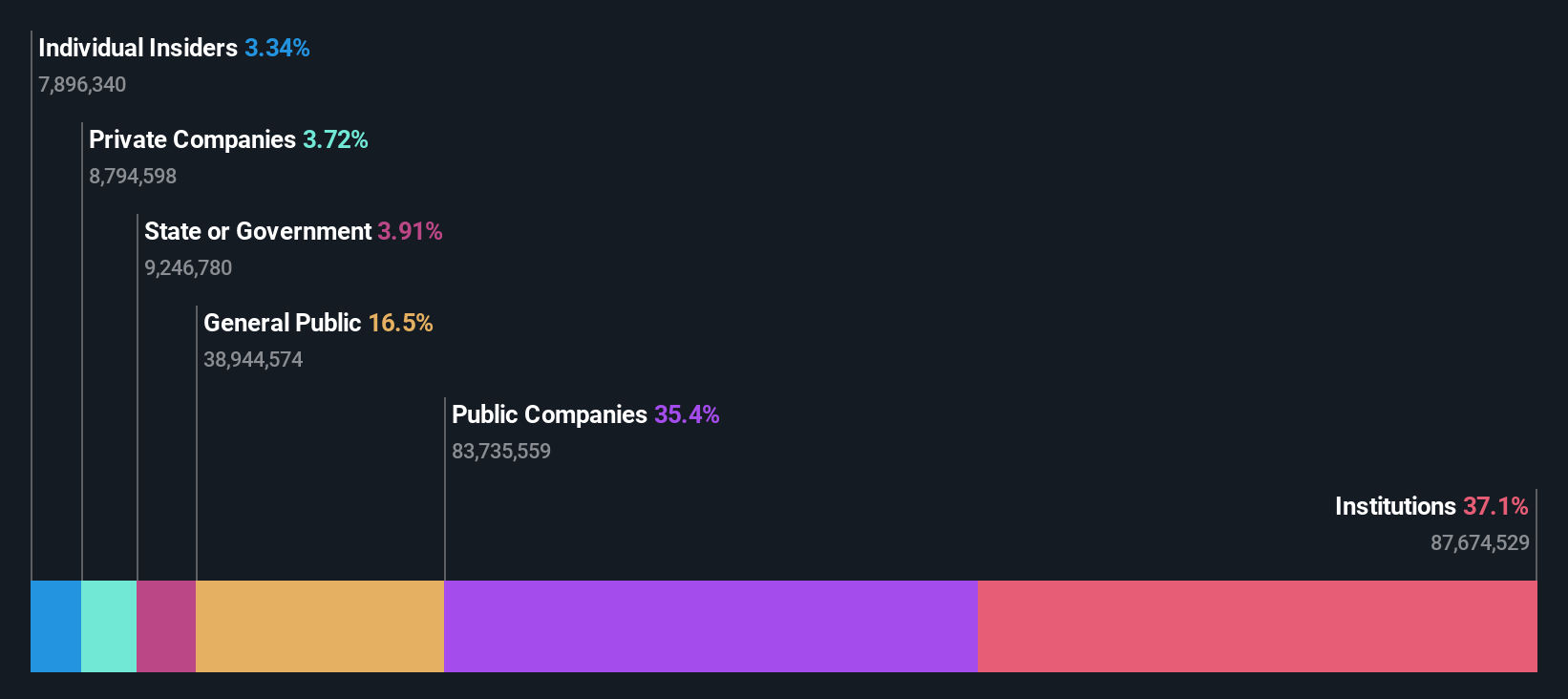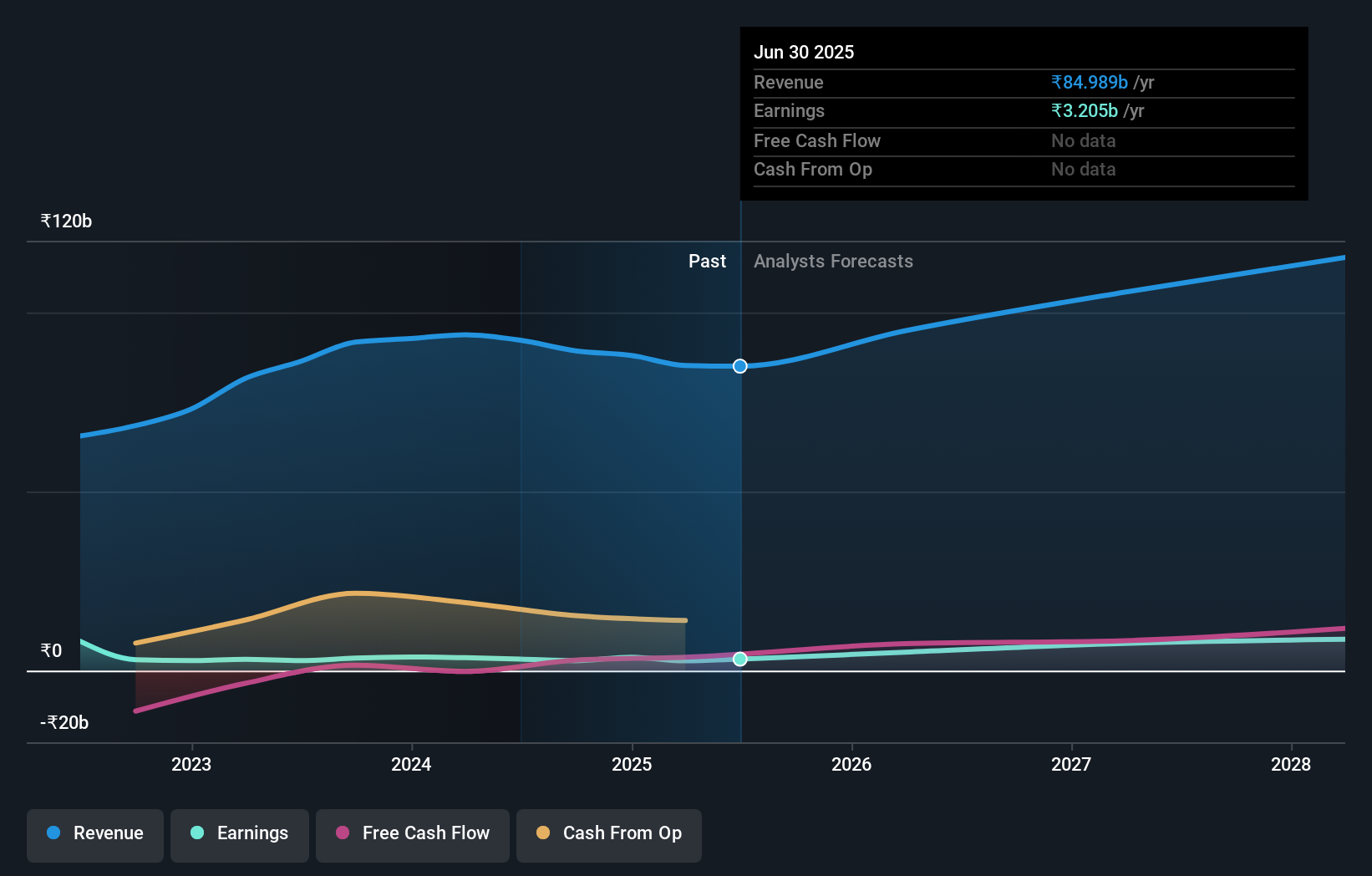- India
- /
- Basic Materials
- /
- NSEI:RAMCOCEM
Institutional investors in The Ramco Cements Limited (NSE:RAMCOCEM) lost 4.0% last week but have reaped the benefits of longer-term growth
Key Insights
- Significantly high institutional ownership implies Ramco Cements' stock price is sensitive to their trading actions
- A total of 6 investors have a majority stake in the company with 51% ownership
- Analyst forecasts along with ownership data serve to give a strong idea about prospects for a business
If you want to know who really controls The Ramco Cements Limited (NSE:RAMCOCEM), then you'll have to look at the makeup of its share registry. And the group that holds the biggest piece of the pie are institutions with 37% ownership. That is, the group stands to benefit the most if the stock rises (or lose the most if there is a downturn).
No shareholder likes losing money on their investments, especially institutional investors who saw their holdings drop 4.0% in value last week. However, the 27% one-year return to shareholders may have helped lessen their pain. They should, however, be mindful of further losses in the future.
Let's delve deeper into each type of owner of Ramco Cements, beginning with the chart below.
View our latest analysis for Ramco Cements

What Does The Institutional Ownership Tell Us About Ramco Cements?
Institutions typically measure themselves against a benchmark when reporting to their own investors, so they often become more enthusiastic about a stock once it's included in a major index. We would expect most companies to have some institutions on the register, especially if they are growing.
Ramco Cements already has institutions on the share registry. Indeed, they own a respectable stake in the company. This can indicate that the company has a certain degree of credibility in the investment community. However, it is best to be wary of relying on the supposed validation that comes with institutional investors. They too, get it wrong sometimes. If multiple institutions change their view on a stock at the same time, you could see the share price drop fast. It's therefore worth looking at Ramco Cements' earnings history below. Of course, the future is what really matters.

We note that hedge funds don't have a meaningful investment in Ramco Cements. The company's largest shareholder is Ramco Industries Limited, with ownership of 22%. Rajapalayam Mills Limited is the second largest shareholder owning 14% of common stock, and Life Insurance Corporation of India, Asset Management Arm holds about 7.1% of the company stock.
We also observed that the top 6 shareholders account for more than half of the share register, with a few smaller shareholders to balance the interests of the larger ones to a certain extent.
Researching institutional ownership is a good way to gauge and filter a stock's expected performance. The same can be achieved by studying analyst sentiments. There are a reasonable number of analysts covering the stock, so it might be useful to find out their aggregate view on the future.
Insider Ownership Of Ramco Cements
The definition of company insiders can be subjective and does vary between jurisdictions. Our data reflects individual insiders, capturing board members at the very least. Company management run the business, but the CEO will answer to the board, even if he or she is a member of it.
I generally consider insider ownership to be a good thing. However, on some occasions it makes it more difficult for other shareholders to hold the board accountable for decisions.
Our most recent data indicates that insiders own some shares in The Ramco Cements Limited. The insiders have a meaningful stake worth ₹8.2b. Most would see this as a real positive. It is good to see this level of investment by insiders. You can check here to see if those insiders have been buying recently.
General Public Ownership
The general public-- including retail investors -- own 16% stake in the company, and hence can't easily be ignored. While this size of ownership may not be enough to sway a policy decision in their favour, they can still make a collective impact on company policies.
Private Company Ownership
We can see that Private Companies own 3.7%, of the shares on issue. It might be worth looking deeper into this. If related parties, such as insiders, have an interest in one of these private companies, that should be disclosed in the annual report. Private companies may also have a strategic interest in the company.
Public Company Ownership
We can see that public companies hold 35% of the Ramco Cements shares on issue. It's hard to say for sure but this suggests they have entwined business interests. This might be a strategic stake, so it's worth watching this space for changes in ownership.
Next Steps:
While it is well worth considering the different groups that own a company, there are other factors that are even more important. Case in point: We've spotted 2 warning signs for Ramco Cements you should be aware of, and 1 of them shouldn't be ignored.
If you are like me, you may want to think about whether this company will grow or shrink. Luckily, you can check this free report showing analyst forecasts for its future.
NB: Figures in this article are calculated using data from the last twelve months, which refer to the 12-month period ending on the last date of the month the financial statement is dated. This may not be consistent with full year annual report figures.
New: AI Stock Screener & Alerts
Our new AI Stock Screener scans the market every day to uncover opportunities.
• Dividend Powerhouses (3%+ Yield)
• Undervalued Small Caps with Insider Buying
• High growth Tech and AI Companies
Or build your own from over 50 metrics.
Have feedback on this article? Concerned about the content? Get in touch with us directly. Alternatively, email editorial-team (at) simplywallst.com.
This article by Simply Wall St is general in nature. We provide commentary based on historical data and analyst forecasts only using an unbiased methodology and our articles are not intended to be financial advice. It does not constitute a recommendation to buy or sell any stock, and does not take account of your objectives, or your financial situation. We aim to bring you long-term focused analysis driven by fundamental data. Note that our analysis may not factor in the latest price-sensitive company announcements or qualitative material. Simply Wall St has no position in any stocks mentioned.
About NSEI:RAMCOCEM
Ramco Cements
Manufactures and sells cement and construction Chemicals in India.
Reasonable growth potential with acceptable track record.
Similar Companies
Market Insights
Community Narratives




